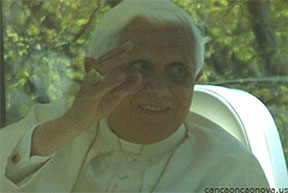 I think of all the things that I encountered during the week that the Pope was here, I believe the most intense of them all was his praying at Ground Zero. He said in his silence what could not be said with words. If you look at it deeper, a religious leader spoke condemnation and hatred to the United States of America when he ordered those towers destroyed. Yet, when the Pope prayed in silence at Ground Zero he in his silence reminded us of God’s love, compassion and mercy. That image will be a lasting one for me for all my life.
I think of all the things that I encountered during the week that the Pope was here, I believe the most intense of them all was his praying at Ground Zero. He said in his silence what could not be said with words. If you look at it deeper, a religious leader spoke condemnation and hatred to the United States of America when he ordered those towers destroyed. Yet, when the Pope prayed in silence at Ground Zero he in his silence reminded us of God’s love, compassion and mercy. That image will be a lasting one for me for all my life.
What does that image say to us in light of whom we are? Well, let’s take a look at the Gospel because today’s message has a lot to tell us about the Pope’s actions at Ground Zero, our faith and our future.
This passage comes from the 14th Chapter of John, it is one of the three chapters that we call Jesus’ farewell discourse. Here Jesus is giving, in a sense, his final instructions to his Apostles before his prayer in the garden and his arrest, torture and crucifixion.
Notice that it is here that he talks about commandments and signs of his love. If we love him we will keep his commandments. But look at that sentence again. Notice he does not say, The Commandments which we may assume to be the Ten Commandments, but he says My Commandments.
What does he mean by his commandments? Well, in this question we look at the words of Jesus in the previous chapter where he says, “Love one another. As I have loved you, so you also should love one another.This is how all will know that you are my disciples, if you have love for one another.”
Often times we think of the Ten Commandments, when we see the word commandments. Yet, the question we need to investigate is: When Jesus talks about the Commandments does he mean simply the Ten Commandments. I say clearly no.
Now this does not mean that Jesus discounts the Ten Commandments, clearly he does not when he says elsewhere that he did not come to eliminate one jot or tittle of the law. Yet, he is defining devotion not only in action but in signs. The action is love and the sign is that through that love all will know that we are his disciples and that this love will be the door through which God enters our lives.
This means that the standard of just following the law has been changed to one of putting our faith in action. Our faith is defined in loving one another. This is important because you can live the Ten Commandments and never love in your life. In fact, St Paul defines the person who calls himself faithful but does not love, even if he is martyred for that faith is nothing more than a noisy gong or a clanging cymbal.
Let us then look at this in light of the Pope’s actions. What the Pope did at Ground Zero was to manifest God’s love and in so doing so he showed the world God’s love and mercy. He stood in contrast with one who defined religion solely in law. This also brings us to the reality that if we make following rules our standard, then we can never do what the Pope did in New York or even in the lives of our neighbors.
There is an old saying that you and I are called to “walk the talk” The Holy Father showed us that this is wrong. We are called to BE the talk not just walk it. In fact, that is what he did. He was the talk.
This means not just us individually, but us as a community. Jesus has commanded St. Benedict Parish to be a place where the parishioners love each other and love God in a way that God becomes manifest in this parish and people know they are in the presence of God when they are here. You cannot do that if your standard is only to do what the rules say. When we come to mass as an act of love, when we treat each other out of this love, then we are actually living our faith. The rules give us the minimum standard. If we are not living that standard, then we are not living the standard to which Jesus calls us. However, if we are only living that rules standard then we are just doing the minimum and are no where near where Jesus calls us.
So when we are at this parish, we need to make this parish not in a way in which people say, boy those parishioners at St. Benedicts, they sure are good at following rules down there. But, when I enter that parish, when I worship at St. Benedict’s when I encounter those parishioners, I encounter Christ. My life is changed when I attend mass there.
I entered that church thinking that maybe God exists, I left that Church knowing that God exists. That is the commandment that Jesus gives to us.
How do we make that a reality? Prayer and relationship with Christ and then sharing that relationship with one another. This is an essential element to make us people of love and then allowing Christ or as we see in this passage, the Holy Spirit to change us and transform us.
To what does he transform us, again look back at the Pope. A simple man, who has a massive job who in showing the face of Christ is able to bring the city of New York to silence. Why, because he is not showing his power, he is showing God’s truth, because God is love.
When our parish is growing it is because it is a place of love. We need to foster that love, because that is what Jesus calls us to do. Every member of this parish needs to feel that love. Once they feel it, they are capable of giving it. This becomes exponential. We grow in love. That love is our spiritual nourishment. It enables us to grow in humanity and become more human. St. Irenaeus said that the Glory of God is a man fully alive. That love makes us fully alive. It is showing each other the face of Christ each and every day.
It is saying to everyone who enters this Church, you are in a safe place, come join us and meet the one who nourishes us in each other.
This means, we need to look for the signs of a loving parish and embrace them and the signs of an unloving parish and dismiss them. If you look at those who condemn us because we are Catholics you notice invariably they are humanizing people. Often they are nasty, condemning and seek to take away our peace. They exalt themselves at your expense and they laugh at our mass attendance and rituals. They may consider themselves free from religion, but they do not appear to be people with whom we are comfortable in community. They do not show the face of Christ, only the ability to understand rules, whether they embrace them or reject them. They do not manifest love, only self-centeredness and hatred.
Yet, when people come here and say, I feel good here. Even when they are challenged, then we are building a community that manifests God. Remember people may not feel comfortable, they may feel safe and challenged, but not always comfortable that is good. This is because God challenges us at times and leads us to meet those challenges in a way that we grow in faith, hope and love. That at times may make us feel uncomfortable, but good, that we are growing in faith.
Make it your point to ask God to help you manifest him in the lives of others everyday. When you do that, then you are living the faith.

This is why, prayer for each other is important. This is why knowing each other is important. For we meet Christ in one another, if we all answer our call to be Christ’s to one another. Indeed, St. Paul also calls us to outdo one another in holiness. In a sense he calls us to be in competition with each other in holiness, that the whole parish may grow in holiness. When we do that, we do exactly as we are told in Christ.
If you want to see the fruit of this, you need look no further than the Pope kneeling in prayer, in silence at Ground Zero in New York City.
Photo Credits:
Canção Nova
Bottom: Paha_l via bigstockphoto.com >

